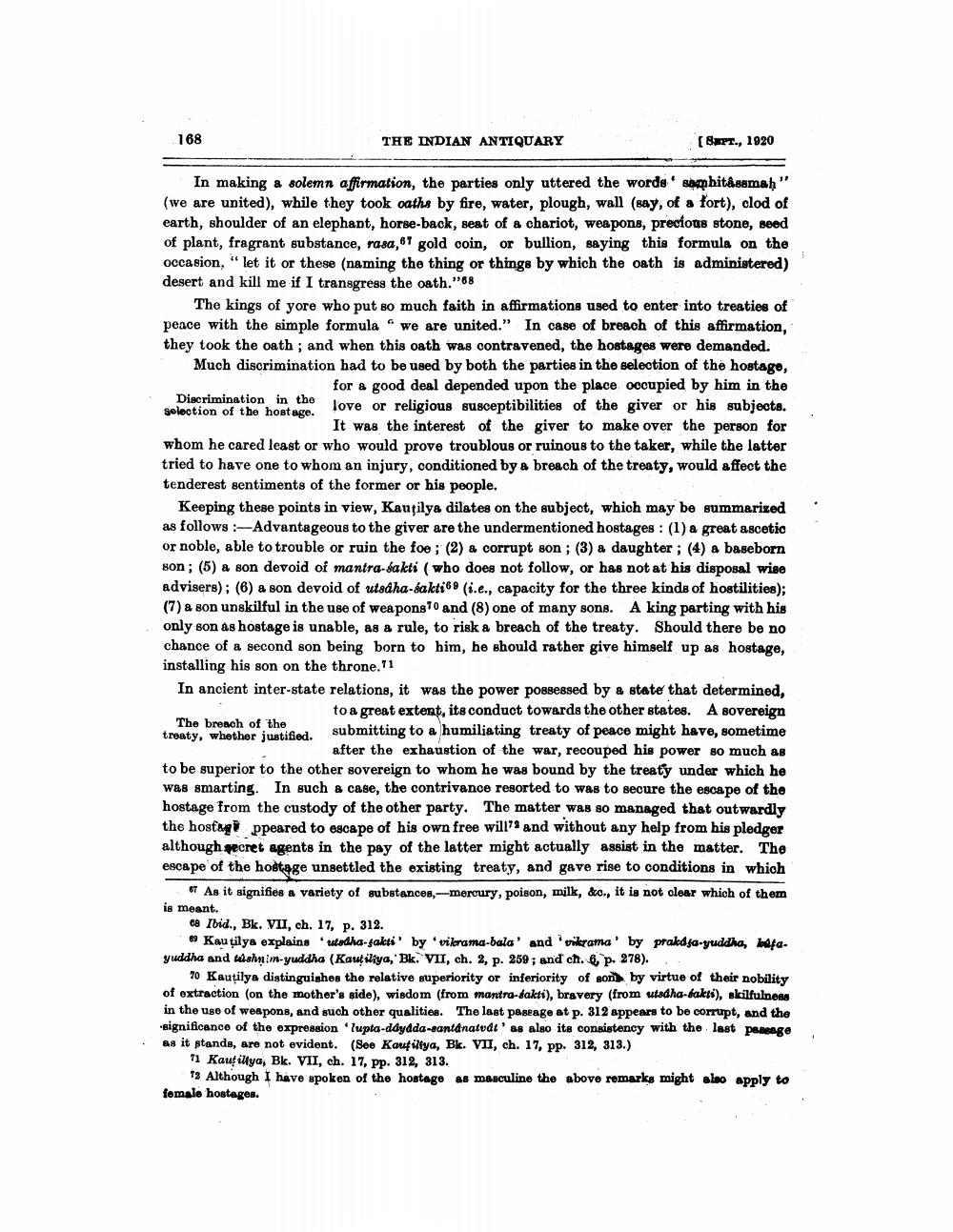________________
168
THE INDIAN ANTIQUARY
[SEPT., 1920
#
In making a solemn affirmation, the parties only uttered the words samhitâssmaḥ" (we are united), while they took oaths by fire, water, plough, wall (say, of a fort), clod of earth, shoulder of an elephant, horse-back, seat of a chariot, weapons, precious stone, seed of plant, fragrant substance, rasa,67 gold coin, or bullion, saying this formula on the occasion, "let it or these (naming the thing or things by which the oath is administered) desert and kill me if I transgress the oath."68
The kings of yore who put so much faith in affirmations used to enter into treaties of peace with the simple formula" we are united." In case of breach of this affirmation, they took the oath; and when this oath was contravened, the hostages were demanded.
selection of the hostage.
Much discrimination had to be used by both the parties in the selection of the hostage, for a good deal depended upon the place occupied by him in the Discrimination in the love or religious susceptibilities of the giver or his subjects. It was the interest of the giver to make over the person for whom he cared least or who would prove troublous or ruinous to the taker, while the latter tried to have one to whom an injury, conditioned by a breach of the treaty, would affect the tenderest sentiments of the former or his people.
Keeping these points in view, Kautilya dilates on the subject, which may be summarized as follows:-Advantageous to the giver are the undermentioned hostages: (1) a great ascetic or noble, able to trouble or ruin the foe; (2) a corrupt son; (3) a daughter; (4) a baseborn son; (5) a son devoid of mantra-sakti (who does not follow, or has not at his disposal wise advisers); (6) a son devoid of utsaha-sakti69 (i.e., capacity for the three kinds of hostilities); (7) a son unskilful in the use of weapons 70 and (8) one of many sons. A king parting with his only son as hostage is unable, as a rule, to risk a breach of the treaty. Should there be no chance of a second son being born to him, he should rather give himself up as hostage, installing his son on the throne."1
The breach of the
In ancient inter-state relations, it was the power possessed by a state that determined, to a great extent, its conduct towards the other states. A sovereign treaty, whether justified. submitting to a humiliating treaty of peace might have, sometime after the exhaustion of the war, recouped his power so much as to be superior to the other sovereign to whom he was bound by the treaty under which he was smarting. In such a case, the contrivance resorted to was to secure the escape of the hostage from the custody of the other party. The matter was so managed that outwardly the hostag ppeared to escape of his own free will's and without any help from his pledger although secret agents in the pay of the latter might actually assist in the matter. The escape of the hostage unsettled the existing treaty, and gave rise to conditions in which
67 As it signifies a variety of substances,-mercury, poison, milk, &c., it is not clear which of them is meant.
e8 Ibid., Bk. VII, ch. 17, p. 312.
•
Kautilya explains utsdha-sakti' by 'vikrama-bala' and 'vikrama' by prakása-yuddha, kútayuddha and tashnim-yuddha (Kautilya, Bk. VII, ch. 2, p. 259; and ch. 6, p. 278).
70 Kautilya distinguishes the relative superiority or inferiority of son by virtue of their nobility of extraction (on the mother's side), wisdom (from mantra-sakti), bravery (from utsdha-fakti), skilfulness in the use of weapons, and such other qualities. The last passage at p. 312 appears to be corrupt, and the significance of the expression 'lupta-ddydda-santanatvdt' as also its consistency with the last passage as it stands, are not evident. (See Kautilya, Bk. VII, ch. 17, pp. 312, 313.)
71 Kautilya, Bk. VII, ch. 17, pp. 312, 313.
72 Although I have spoken of the hostage as masculine the above remarks might also apply to female hostages.




